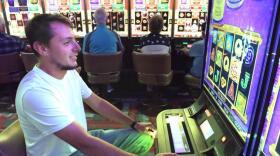
This week, NHPR has been taking a close look at what a casino would mean for the town of Salem, a likely location for a gambling establishment. On Wednesday, the House voted down the idea of expanded gaming. We end our series today with a look back at the best—and worst—times The Rock has faced.
In the 1940s, Rockingham Park was the place to be. Trains packed with Bostonians pulled right up to the grandstand. Seventy-nine year old Charlotte Hamilton saw it all. Her father was a starter at the track, and she practically grew up there. When she was ten, she rode in a Plow Horse Derby for local kids. Her dad let her use a horse from the stables.

“I had a horse, is name was Major, and he was 17 hands high. He had no bridle, I had a hunk of rope around his nose, up around his neck, no saddle. And they dropped a flag, ok, and everybody took off," Hamilton says, clapping her hands for emphasis. "My horse Major turned around and went the other way! My father, my poor father, must have been so embarrassed," she remembers with a laugh.
But more serious, regular thoroughbred racing had only been going on for about a decade. There were a few illegal races back when Rockingham Park was first built, in 1906. Then in the 1930s, new owner Lou Smith convinced lawmakers to legalize racing at The Rock. During his 36 year tenure, track revenues on average made up 20 percent of the state’s general fund appropriations.
But things have changed in many ways, says Hamilton, taking a shaky breath, "I have ever so many memories, I could cry right now! Because of the deplorable condition of the barn area. That’s a lot of acres over there going to waste, going to rot.”
But even back in the 1940s, most racetracks like Rockingham Park were on borrowed time.
“It’s clear that there’s been a big change over the past 60 or 70 years,” says David Schwartz, a gambling historian at the University of Nevada-Las Vegas.
“And in the 1950s [racing is] still fairly strong, but is beginning to weaken. And in the 60s, as TV becomes more widespread, you really start to see that shift. And that really manifests itself in the 70s and 80s,” Schwartz says.

If there’s anyone who appreciates TV, it’s Larry Seaman. He’s Program Director at Salem Community Television. He's got fond memories of the track.
“I remember listening on my little transistor radio, and they would always broadcast the last race of the day," Seaman says.
For an 18-year old in the early 70s, The Rock was still the place to be.
“And actually, I think you had to be 21 to get in," Seaman says with a laugh. "But I was with my brothers who were of age, and they took me in! And I was awed at the facility. It was really something special.”
But in 1980, fire gutted the grandstand. The owners sold to Rockingham Venture. And they built the red-roofed grandstand that greets visitors today.
Company President Ed Callahan sits in a room full of empty seats and stacked chairs. It’s the quietest place here. Dust covers everything. The track is barren, with paint peeling off crooked signs. This is where racing fans once cheered their horses.
Today, workers use the area as a shortcut to go outside on their smoke breaks.

Abandoned buildings and empty stables litter the 170 acre site. Callahan says he’s doing the best he can to keep it all up on a tight income. He says things were going well when Rockingham Park reopened in the '80s. But it was crippled in the '90s when other states started allowing slots and casinos at racetracks. With that extra cash, they could offer much bigger purses.
“At that time, we were offering about $100,000 a day in purses. To be competitive, we had to be in about $180-$200,000 range.”
So they switched to harness racing about 10 years ago, where horses pull jockeys riding in carts. That ended in 2010, when the state cut the Racing Commission’s regulatory funding.
Today, simulcasting is the last vestige of horseracing at the old track. Stacey Rudolph and Maureen Erekson have been working here for 25, 30 years. They handle the simulcasting bets. And they clearly love their jobs. Rudolph asks, "Do you know how to gamble?" Erekson quickly adds, "You should come see us! We'll help you pick the horses! We'll train you in how to pick the horses."

Just as important as the actual betting, Rudolph says, is the emotional connection gamblers have with their horses. "And this here, you've got to pick out your horse, and then you develop a little fanship for it!"
The influence and prestige of Rockingham Park was at its peak from the 1930s through the 60s. Seabiscuit raced here, and so did one of Bing Crosby’s horses. Louis B. Mayer, Wilt Chamberlain, and the Crown Prince of Liechtenstein made appearances. And for now, with no new casino on the horizon, Callahan says they’ll just have to keep doing the best they can. But eventually, the owners might have to consider taking The Rock in a different direction.


















